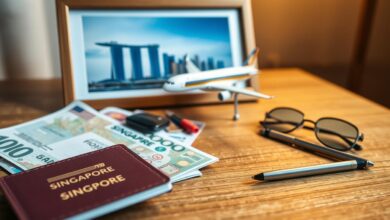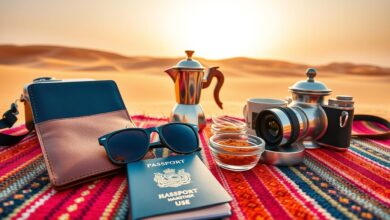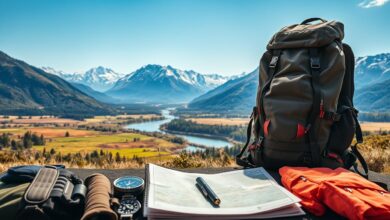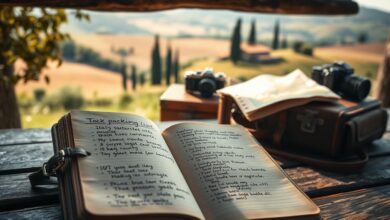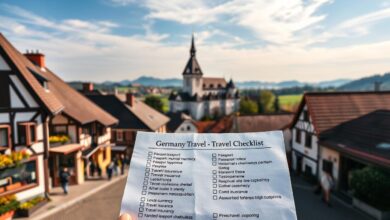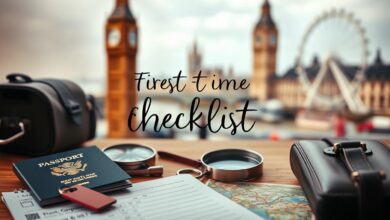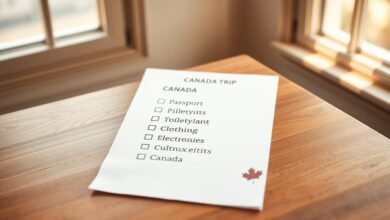Australia Flight and Travel Checklist: Key Documents and Arrival Benefits
Anúncios
Traveling to Australia needs careful planning, especially for Nigerian travelers.
A detailed travel checklist Australia is key for a smooth trip. Important documents like visas, passports, and travel insurance are vital. With these, travelers can easily enter the country.
Anúncios
Being well-prepared makes customs processing smoother and improves the travel experience. This guide stresses the importance of the right documents and planning. Following this Australia packing list helps travelers enjoy the country’s beauty and culture more.
Understanding Visa Requirements for Australia
Before you head to Australia, it’s key to know about visa needs. Understanding the different visas is a good start. Each visa is for a specific reason, like tourism, study, or work. A good travel checklist for Australia should include personal items and the right documents for a smooth entry.
Anúncios
Different Types of Visas for Travelers
Australia has many visa options for different travelers. Here are some main ones:
- Visitor Visa: For tourists staying temporarily.
- Student Visa: For those studying in Australian schools.
- Work Visa: For people wanting to work in Australia.
- Business Visa: For business visitors and entrepreneurs.
How to Apply for a Visa
The visa application process varies by visa type. You’ll need to gather important documents like proof of where you’ll stay, your travel plans, and how much money you have. You can apply online through the Australian Department of Home Affairs website. There, you’ll find all the details you need for your application.
Visa Application Fees and Processing Times
Visa fees change based on the visa type. Fees can range from AUD 145 for visitor visas to thousands of AUD for more complex ones. Processing times also vary. Simple tourist visas might take 20 days, while work visas can take months.
Knowing these details helps you plan better. It’s crucial to include visa information in your travel checklist for Australia.
Essential Travel Documents for Your Trip
To have a smooth trip to Australia, you need the right travel documents. An Australian travel checklist is key. It shows the must-have items for your trip, ensuring you meet all requirements before you go.
Passport Requirements and Validity
Travelers need a valid passport that meets Australian immigration rules. Passports should be valid for at least six months after your planned departure. This ensures flexibility and avoids last-minute passport issues.
Travel Insurance: Why It’s Important
Getting comprehensive travel insurance is crucial for Australia. It covers unexpected medical costs, trip cancellations, and lost items. Without it, you could face big financial problems if emergencies happen.
Copies of Important Documents
Having copies of important documents helps if they get lost or stolen. Make copies of passports, visas, travel insurance, and emergency contacts. Keep these copies in a safe place to ensure your safety and peace of mind in Australia.
Packing Smart for Australia
Packing for Australia needs careful thought, especially with its different climates. The north is hot and humid, while the south is cooler. Good packing tips can make your trip better.
Clothing Considerations by Region
Australia’s big size means different weather everywhere. In the north, wear light clothes because it’s hot and wet. In the south, you’ll need warmer clothes like jackets and layers. Check an Australia packing list for the best clothes for each area.
Essential Electronics and Adapters
Don’t forget the electronics you need to stay connected. A universal power adapter is key for charging, since Australia’s outlets are different. A portable charger is also handy for extra power in remote spots.
Health and Safety Items to Consider
It’s important to pack health and safety items for a safe trip. A first aid kit can help with small injuries. Don’t forget sunscreen to protect against the sun, especially outside.
| Item | Purpose |
|---|---|
| Lightweight Clothes | Suitable for warm and humid climates |
| Jackets and Layers | Essential for cooler southern regions |
| Universal Power Adapter | To connect electronics to Australian outlets |
| Portable Charger | Provides additional battery life on the go |
| First Aid Kit | For treating minor injuries |
| Sunscreen | Protects against UV rays |
Preparing Finances for Your Journey
Getting your finances ready is key to a great trip to Australia. Knowing how to handle money, use cards, and budget can make your trip better. This part talks about smart ways to exchange money, use cards, and plan your budget.
Currency Exchange Tips
Smart currency exchange can save you money. It’s wise to exchange Nigerian Naira for Australian Dollars when rates are good. Keep an eye on rate changes and exchange at banks or trusted bureaus to avoid high fees.
Don’t exchange money at airports. Rates there are usually worse.
Using Credit and Debit Cards in Australia
Credit and debit cards are easy to use in Australia. Many places accept them, making cash less needed. Tell your bank about your travel plans to avoid card problems abroad.
It’s smart to have another way to pay in case of card issues.
Budgeting for Your Trip
Good budgeting lets you enjoy Australia without worrying about money. Plan your daily costs for fun, food, and travel. This helps you know what to expect.
Use budgeting apps to track your spending. They help you stay on budget while exploring and trying new foods.
Health and Safety Precautions
Knowing about health and safety tips makes traveling in Australia better. It’s important to know about needed vaccinations, get health insurance, and have emergency contacts ready. Adding these to your travel checklist helps you be ready for anything.
Recommended Vaccinations for Travelers
Travelers should think about getting these vaccinations before going to Australia:
- Hepatitis A
- Hepatitis B
- Tetanus
- Influenza
Talking to a doctor can help you get advice that fits your health and travel plans.
Traveler’s Health Insurance Overview
Getting travel health insurance is key to cover unexpected medical costs. Policies differ, so it’s important to compare them. Look for coverage for emergencies, hospital stays, and evacuations. This ensures you’re safe and prepared in Australia.
Emergency Contact Information
It’s vital to have emergency contact numbers handy. Include:
- Local emergency services (e.g., 000 in Australia for police, fire, and ambulance)
- Your country’s embassy or consulate contact information
- Travel insurance provider contact details
Having this info easily accessible makes your trip safer and more worry-free in Australia.
Communication While Traveling
Good communication is key to a great trip in Australia. Knowing how to stay connected and find your way around is important. Here are some must-haves for communication while traveling in Australia.
Setting Up Mobile Services
It’s smart to set up your mobile services before you go. You can get a local SIM card or an international roaming plan. Local SIMs are usually cheaper for calls and data.
Companies like Telstra and Optus have prepaid plans for tourists. Do your research to pick the best option.
Internet Access in Australia
Getting online in Australia is easy, especially in cities. Cafes, libraries, and hotels often have free Wi-Fi. This makes it easy to stay in touch.
But, internet might be scarce in rural areas. Consider portable Wi-Fi devices or mobile hotspot plans for reliable access. Knowing where to find these can make your trip better.
Navigating Language Barriers
English is the main language in Australia, making communication easier for many. You might find some regional words and slang tricky, but locals are usually friendly and helpful.
Learning common phrases and asking for help when needed is a good idea. This approach makes your trip more enjoyable and helps you connect with the local culture.
Transportation Options Upon Arrival
When you arrive in Australia, knowing your transportation options is key. A good travel checklist should cover major airports and ground transport. Cost, convenience, and local rules play big roles in your choice.
Overview of Australian Airports
Australia has many international airports, with Sydney’s Kingsford Smith being the busiest. Melbourne Tullamarine, Brisbane, and Perth are also major ones. These airports have amenities like food and currency exchange, making arrival easier. Knowing these airports helps plan your ground transport.
Ground Transportation Choices
Australia offers many ground transport options, fitting different needs and budgets. You can pick from:
- Taxis, found at taxi ranks.
- Airport shuttles, for direct hotel transfers.
- Public buses, a cheap way to get around cities.
Before choosing, check fares and times to ensure a smooth trip. These tips can make your arrival in Australia better.
Renting a Car vs. Public Transport
Choosing between a rental car and public transport depends on several factors:
| Criteria | Renting a Car | Public Transport |
|---|---|---|
| Cost | More expensive, with fees for rental, insurance, and fuel. | Less costly, with fares for different transport types. |
| Convenience | Flexible, with your own schedule and routes. | Depends on existing routes and times. |
| Navigation | Needs local traffic law knowledge. | No need to navigate, great for city travel. |
| Environmental Impact | Higher emissions per person. | More eco-friendly when shared. |
Thinking about these points helps you choose wisely. Good planning here matches a detailed travel checklist for Australia.
Understanding Local Customs and Etiquette
Knowing local customs makes traveling in Australia better. It’s important to learn about tipping, greetings, and cultural sensitivity. This way, you can have positive interactions and learn more about the local culture.
Tipping Practices in Australia
Tipping in Australia is nice but not required. In restaurants, a 10% tip is common if the service is great. For taxis and hotels, a small tip is okay, but round numbers are fine.
Greeting and Farewell Customs
Australians like casual and friendly greetings. A handshake and direct eye contact are usual when meeting. Say hello with a smile and use first names to be friendly.
When you leave, saying “See you later” or “Catch you soon” is enough. These simple gestures show Australia’s friendly nature.
Aboriginal Cultural Sensitivity
It’s key to respect Aboriginal culture when visiting Australia. Learn about their traditions and heritage. By doing this, you can make your trip more meaningful.
Activities and Attractions to Explore
Australia is full of diverse activities and attractions for every traveler. You can explore vibrant cities and stunning natural landscapes. These experiences make your trip unforgettable. Don’t forget to visit must-see cities and iconic sites to enjoy Australia’s unique charm.
Must-Visit Cities: Sydney, Melbourne, and Beyond
In Sydney, the Sydney Opera House and Harbour Bridge are iconic. You can try local food, explore markets, and walk along the coast. Melbourne is known for its art, street art, and coffee culture. Brisbane and Perth also offer unique experiences.
Natural Wonders and National Parks
The Great Barrier Reef is a famous natural wonder for diving and snorkeling. National parks like Kakadu and Uluru-Kata Tjuta show off Australia’s landscapes and wildlife. These parks are great for hiking, spotting wildlife, and learning about local cultures.
Unique Australian Experiences
For adventure, try surfing at Bondi Beach or snorkeling in Ningaloo Reef. Wildlife lovers can see kangaroos, koalas, and birds in their homes. These experiences show Australia’s outdoor lifestyle and nature.
Adding these activities to your travel checklist ensures a full exploration of Australia. From cities to landscapes, Australia invites you to make lasting memories with its culture and nature.
Enjoying Australian Cuisine
Australian cuisine is a mix of many cultures, making it vibrant and rich. Visitors can try many dishes that show this diversity. Some dishes are especially popular and unique.
Popular Dishes to Try
Meat pies are a classic in Australia, filled with minced meat and gravy. Pavlova, a meringue dessert with fresh fruit, is also a must-try. Seafood fans should try barramundi, a tasty local fish.
These dishes show Australia’s culinary creativity. They invite travelers to taste local flavors.
Food Safety Practices
When trying local food, travelers should follow food safety practices for traveling. Choose well-known food stalls and restaurants, especially for street food. Watch how food is prepared and pick fresh items.
Be careful with raw foods, like seafood, to avoid health issues.
Dietary Considerations and Options
Australia offers food for all, including vegetarians, vegans, and those who follow halal diets. In restaurants, ask for special dishes or adjustments. Knowing about local ingredients and how they’re prepared can make your meal better.
Final Checklist Before Departure
As you get ready to travel to Australia, a final checklist is key. It makes sure you have all the essentials for your trip. Before you go, check your flight, baggage rules, and make sure your passport and travel documents are ready.
Last-Minute Preparations
Double-check your travel list for Australia. Make sure everything is packed and ready. Check your accommodation and travel to the airport plans. Also, plan to arrive at the airport early to handle any delays and security checks.
Travel Tips for a Smooth Journey
Have your visa, passport, and health insurance info ready for a smooth airport experience. Staying hydrated and bringing snacks can make long flights more comfortable. Knowing Australia’s time zone helps you adjust after you arrive.
Resources for Further Information
For more help, check out official travel advisories and travel forums. They offer updates and tips. These resources are great for learning about entry rules, local customs, and more to make your trip better.
For more information, see the official travel site:
You will be redirected to another website
FAQ
What are the essential items for travel in Australia?
For travel in Australia, you’ll need a valid passport and visa. Don’t forget travel insurance and a power adapter for your electronics. Wear comfortable clothes for different climates. Remember to pack sunscreen, a first aid kit, and any personal medications.
Using a detailed Australia packing list helps ensure you don’t forget anything important.
How can I create an effective travel checklist for my trip to Australia?
Start your checklist with important documents like your passport and visa. Add essential items like clothes and toiletries. Don’t forget travel electronics like chargers and adapters.
Organize items by use, like travel essentials, health and safety items, and recreational gear. This makes packing easier.
Are there specific packing tips for different regions in Australia?
Yes, packing tips vary by region. For tropical northern Australia, wear light, breathable clothes and use insect repellent. In the temperate south, layer up and bring a medium-weight jacket for cooler nights.
Check the season and your plans when packing your Australia packing list.
What are the budgeting considerations for my journey to Australia?
Budgeting for Australia involves costs like accommodations, food, transportation, and activities. Research average prices and set a daily budget. Use currency exchange tips to get the best rates when converting Nigerian Naira to Australian Dollars.
What are the health and safety precautions I should take when traveling to Australia?
For health and safety in Australia, get recommended vaccinations and buy travel health insurance. Keep a list of emergency contacts handy. Pack a first aid kit, sunscreen, and any personal medications you need.
How can I stay connected while traveling throughout Australia?
To stay connected, consider a local SIM card or check your carrier’s international roaming plans. Public Wi-Fi is common in cities, and many cafes and accommodations offer free internet.
What are the must-visit attractions in Australia?
Must-see spots in Australia include Sydney’s Opera House and Melbourne’s cultural precinct. Don’t miss the Great Barrier Reef and national parks. Australia offers unique experiences like wildlife encounters and scenic coastal drives. Plan carefully to enjoy these fully.
What are common dietary options available in Australian cuisine?
Australian cuisine offers a wide range of options, from traditional dishes like meat pies and pavlova to international flavors. Vegetarian and halal foods are also available. Always ask about food safety to ensure a safe dining experience.
Published on: 15 de April de 2025

